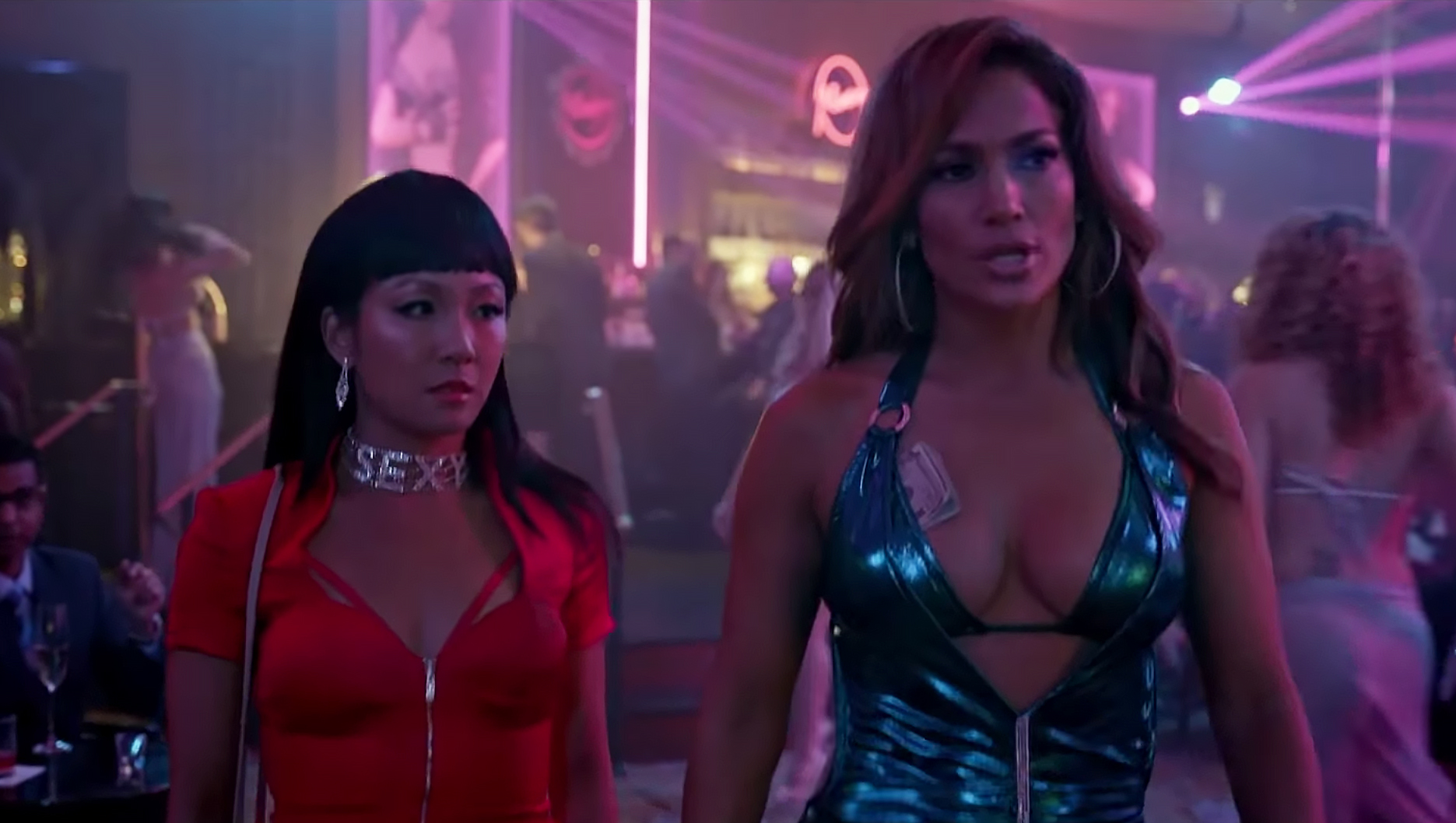Sometimes in a movie, a character moment matches so perfectly to the song it’s set to that it becomes impossible to picture the scene with any other soundtrack. Tom Cruise as Lestat in the final moments of Interview with the Vampire only works because of The Rolling Stones’ “Sympathy for the Devil”; Christian Bale’s Patrick Bateman in American Psycho simply must wield his axe to Huey Lewis and the News’ “Hip to Be Square.”
Other times, though, filmmakers lean on the soundtrack like a crutch to prop up a thinly written character. Margot Robbie as Harley Quinn did an admirable job of writhing and grinning to Lesley Gore’s “You Don’t Own Me” during her character’s introduction in Suicide Squad—but the rest of the movie is a muddled mess, and Gore’s anthem to liberation deserved a better avatar. All of which is to say that filmmakers need to choose their characters’ identifying songs carefully, and that anyone looking to put together a movie about a complex woman would do well to listen closely to Fiona Apple’s just-released new album, Fetch the Bolt Cutters.
Anyone looking to put together a movie about a complex woman would do well to listen closely to Fiona Apple’s just-released new album, Fetch the Bolt Cutters.
Apple’s greatest hits consistently pop up in moody, mid-brow television series, usually those with a sexy and/or female slant: The Chilling Adventures of Sabrina, Girls, Euphoria, The Affair, The Handmaid’s Tale. The 1998 movie Pleasantville featured her version of The Beatles’ “Across the Universe,” a cover that pops up on other soundtracks from time to time. But it’s in two female-fronted ensemble movies—Bridesmaids and Hustlers—that we see what the power of adding Apple to a scene can really be.
In 2011’s Bridesmaids, self-sabotaging Annie (Kristen Wiig, who co-wrote the screenplay with Annie Mumolo) is a former professional baker who semi-recently lost her bakery, her boyfriend, and a little bit of her will to live. Over the movies first act, we see Annie interact with her fuckboi sex partner, co-workers, roommates, mom, best friend, future frenemy, and eventual love interest. Then, finally, we see her alone, in the much-written-about “cupcake scene.” Exhausted, emotionless, Annie makes exactly one magenta cupcake from scratch and decorates it to look like a flower, going so far as to paint the individual petals. Then she eats it. Neither action makes her feel any better. It’s the only part of the movie without any dialogue or any comedy (except, perhaps, the joke of going to all that trouble to make one cupcake and then eat it by yourself). And over it all plays “Paper Bag:”
Hunger hurts,
And I wanted him so bad, oh, it kills me
’Cause I know I'm a mess he don't wanna clean up
I got to fold ’cause these hands are too shaky to hold
Hunger hurts but starvin' works
When it costs too much to love
When Apple warbles on that last “costs,” you wonder if she’ll make it to the end of the note or collapse and give up. Annie is the paper bag, the mess, too broke to love; I won’t analyze the connection, it’s clear enough. I will point out that this scene wouldn’t work with any other song. If it were something more recognizable, a Joni Mitchell ballad perhaps, it would be distracting, and Alanis Morisette, god bless her, is too angry. Soft indie pop would make Annie too pitiful, undercut her right to real sadness, and a man’s voice would just be patronizing. Only Fiona works.
In 2019’s Hustlers, another Apple song underscores a woman doing the thing she does best. Ramona (Jennifer Lopez, the star of the movie, though not technically the protagonist) pole dances to “Criminal,” and the double-meanings are everywhere. Onstage, she’s in a cage that’s also a pedestal, in control by exposing herself physically, dominating the men around her the closer she gets to the floor. She’s a criminal, the lyrics tell us, “a bad, bad girl,” and she’d have you believe this is a coquettish, naughty little act, though anyone who’s seen the movie knows she’ll be a real criminal by the end, taking advantage of her patrons to get the cash they’re currently throwing at her.
Don't you tell me to deny it
I've done wrong and I wanna suffer for my sins
It’s not totally clear that the song is supposed to be diegetic, but I’d like to think that in that scene she really is making the club play “Criminal,” a final assertion of her spot atop the pyramid (well, atop the pole) of the stripper hierarchy. She doesn’t have to dance to the rock or rap songs the men at the club probably like, nor does she need pop or hip-hip to enhance her performance. She’s Ramona. She’s gonna dance to Fiona Fucking Apple like an angsty liberal arts student, and you’re gonna love her for it.
If it were something more recognizable, a Joni Mitchell ballad perhaps, it would be distracting, and Alanis Morisette, god bless her, is too angry. Soft indie pop would make Annie too pitiful, undercut her right to real sadness, and a man’s voice would just be patronizing. Only Fiona works.
In both scenes, our heroines are performing activities—baking and dancing—traditionally associated with femininity. Activities that many people do for fun, but which these women do (or did) professionally. They are in their elements, completely themselves, wordlessly telling the audience exactly who they are. And a Fiona Apple song helps bridge the gap between viewer and character.
For a performer’s perspective, I spoke to actress Alexis Kay Molnar, whose one-woman show Alexis Molnar Sings the Fiona Apple Songbook (co-conceived with Max Friedman) played in New York City earlier this year. Molnar, who only “dove into” Apple’s work in the past few years, told me, “I don’t think I've ever resonated with someone[’s work] as deeply or as much,” remarking that over the course of putting the show together, “the songs I was listening to would mirror the experiences I was going through.” Apple’s lyrics, especially, manage to convey universal experiences by using hyper-specific language, says Molnar: “Her specificity is so unparalleled. I don’t get how she does it…it’s poetic and yet you get it on the first listen.” Who hasn’t felt like a paper bag? (Whatever that means to you.)
Molnar notes that “[Apple’s] parents met in the ensemble of a Broadway show,” and so her music does have a performative element, a “vaudevillian-baroque-jazz sound” that is “so specifically her.” And she has a performance recommendation, too, for anyone ready to move beyond the J-Lo of it all: “It’s very much a cry-for-help song—criminal. Her performance of it at the VH1 Fashion Awards is the most accurate portrayal of what that song means.”
At the beginning of New York’s quarantine days, Molnar recalled, “Everyone was taking the time to clean and shit, so I just put on Bridesmaids in the background. I haven't watched Bridesmaids in years—I think the last time I saw it was in 2013 at DryBar where you cant listen to it. I was, like, scrubbing the tub with gloves on and I heard “Paper Bag” come on and I was like, ‘Did I hit play on Spotify?’ I did not realize, I did not know, it was in that film, until a month ago. And since then you do not know—you do know—how many times I’ve watched that scene on YouTube. You know exactly. It is so fucking perfect. It is so perfect.” Molnar told me she thinks “Paper Bag” could also play over other scenes in Bridesmaids, and that Apple has a lot of rom-com-ready montage songs. “‘Periphery’…I think that would be a good movie montage song.”
Listening to it now, I agree. And I hope that filmmakers find something personal, interesting, and emotional to do with at least one of the tracks off of Bolt Cutters. Because it works both ways: Music can introduce a movie audience to a character, and movie soundtracks can introduce audiences to good music. Or as Molnar and I decided to call it, “spreading the Gospel of Fiona Apple.” FL








